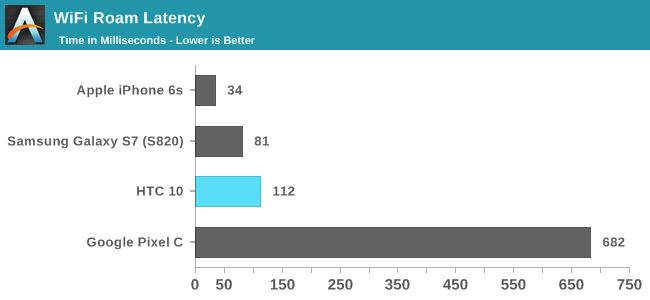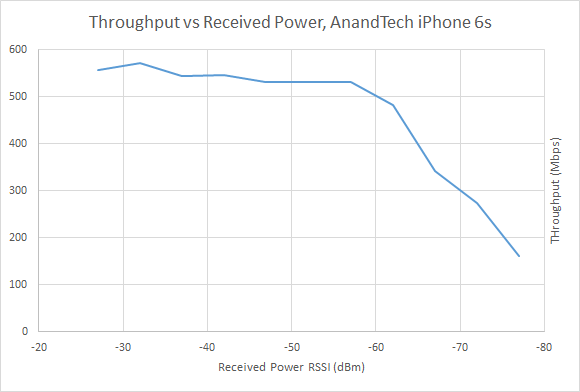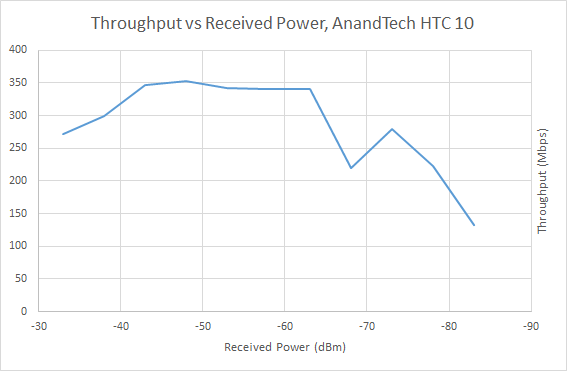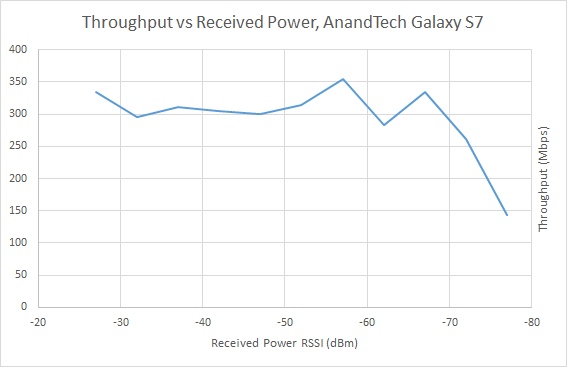The HTC 10 Review
by Joshua Ho on September 19, 2016 8:00 AM ESTWiFi Performance with Ixia IoT
As previously discussed, RF testing has always been a major unknown to some extent because environmental factors make it extremely difficult to tell exactly what is going on with the system. I don’t think it really needs to be said but previous reviews and any controversy regarding the quality of RF has always lead to a ring of confusion and back and forth with no clear-cut answers, at least in the public domain. The Transformer Prime and Pixel C reception issues have all been cases where I’ve seen a lot of confusion over whether a problem really existed in the hardware, software, or with the end user.
Most people really don’t have any understanding of how wireless transmission works, probably because it’s not really something you can see. As far as I know, no one is capable of seeing radio waves, even at high frequencies like 60 GHz. Of course, the problem is that for quite some time our testing was also not really ideal for seeing the quality of an RF implementation. While iPerf does provide some useful data, free space testing means that we’re dealing with channel conditions that inherently cannot be controlled. As a result, the only sensible test we could do with iPerf was focus on maximum throughput in the best conditions we could provide. The only thing that this can highlight is the upper bound of efficiency for WiFi due to the carrier sense multiple access scheme in most cases, and rarely detects a whole class of problems that affect user experience on WiFi.
In order to test these things we’ve moved to using a proper testing system that is actually used by at least a few OEMs today, namely Ixia IoT. While we discussed the possibilities for testing, at this time due to the RF isolation chamber used we are limited to AP simulation only, so we can’t properly simulate clients in the channel without restricting ourselves to a single spatial stream for both the AP and client. This wouldn’t be a very useful test if set up in this manner as most devices today that we’re testing have support for two spatial streams, and many routers have three or even four spatial streams at this point.
The first set of results we can talk about that will be of interest is rate vs range. This is a fairly simple test at a conceptual level, as it simply tries to see how well a device can maintain its performance in the face of reducing signal to noise ratio for a given modulation and coding scheme. This is a good high level test of how well a device can maintain a connection as reception degrades. In this test the HTC 10 had an initial RSSI of -28 dBm while the GS7 was at -21 dBm and the iPhone 6s at -22 dBm, which allows us to calculate the path loss and determine the RSSI as a function of the transmit power.
The results of this test are interesting to say the least. Off the bat, every device had different RSSIs measured, so this meant that everything had different levels of path loss. The HTC 10 seemed to have the most path loss, while the Galaxy S7 and iPhone 6s were functionally identical. However it looks like RSSI is really an insufficient metric here because while the iPhone 6s was able to reach maximum throughput using NSS 2 MCS 8, the HTC 10 and Galaxy S7 did its best at NSS 2 MCS 4 or 5. I suspect this may be just due to placement as device positioning strongly affects MIMO as receive-side spatial correlation reduces the gains that MIMO can provide. Regardless, the HTC 10 somehow manages to beat the Galaxy S7 through much of the curve, but for some reason suffers from a reduction in throughput at higher transmit power. It's worth mentioning though that this test doesn't allow for testing of antenna gain or similar tests. Given various levels of futzing about with the device positioning in the test chamber I'm fairly confident that the Galaxy S7 is consistently better with regard to path loss, so even if it doesn't perform as well at a given RSSI it tends to have a higher RSSI than the HTC 10 by about 5 dBm which is fairly significant. I'm hoping to get some true antenna efficiency measurements with 3D plots in the near future so we can really give some real data on everything relevant here but for now this test highlights fairly well how WiFi performance varies.
Finally, the other test that we can run at this time is the roaming latency test, which tests how well a device can hop from one access point to another as the received transmit power rises and falls. If you ever rely on WiFi to work as you walk around any building larger than a single apartment unit, you’re going to feel the effects of high roaming latency as VOIP calls or any real-time network application will either experience interruption or drop altogether if roaming is not implemented properly.

Like the Galaxy S7, the HTC 10 really struggles with WiFi roaming as it seems almost universal that Android OEMs aren't really paying attention to anything that we don't test. The HTC 10 tended to not fail handover as often as the Galaxy S7 with only one failure out of 64 trials and fairly consistent latency around 110ms though. This is a bit of a surprise considering that the HTC 10 is generally considered in the broader discourse to have worse WiFi across the board compared to the Galaxy S7. Considering how much smaller HTC is this is really kind of strange to see. Just about anything will outperform the Pixel C though. Either way, HTC still should improve here, especially when considering how most schools and offices need good WiFi to make up for areas with cellular coverage gaps.













183 Comments
View All Comments
invinciblegod - Monday, September 19, 2016 - link
I guess you mean looks similar spec wise because it looks nothing like an S7 appearance wise (especially with that weird super chamfer).Meteor2 - Monday, September 19, 2016 - link
HTC's software is far better than Samsung's. That alone puts it ahead of the S7.TheinsanegamerN - Monday, September 19, 2016 - link
A surprising number of people *like* touchwiz for some unknown reason.darkich - Tuesday, September 27, 2016 - link
Multi window!It's by far the best multitasking you can find in any mobile platform, especially on the Galaxy Note devices, where it can basically intuitively, simply and easily do a pc-grade windowing without any issues.
Only thing it can't do is minimizing a game within a window (pointless anyway).
The other feature is screen minimizer which allows easy one handed usage for even the biggest phones.
Impulses - Thursday, September 22, 2016 - link
If I HAD to buy a device over the last six months I would've gone right for the 10, I think it was largely viewed as a totally viable alternative to the S7 by most objective eyes... I'm holding off for the smaller Pixel tho, hoping it doesn't disappoint.Never owned a phone anywhere near as long as I've owned this Nexus 5, and I'm still reluctant to go to a larger device (Sony Z3c is the only other phone to remotely tempt me besides the 10).
damianrobertjones - Monday, September 19, 2016 - link
Dear HTC,Why not try something different? Release 5 Windows Mobile 10 based handsets (Just after MS announces their Surface Phone).
It's worth a shot.
Murloc - Monday, September 19, 2016 - link
the problem with that idea is that WP is dying.Nokia tried doing that and their phone business is currently dead.
WP10 even broke the lockscreen background-changing feature because it was made dependent on silverlight and then they killed silverlight.
Funnily enough, Edge and windows phone internet explorer don't even support silverlight.
The lack of mass market adoption killed app availability, most new apps don't support it, the big ones that do receive updates much later.
Google made sure that no decent youtube app is available too.
ToTTenTranz - Monday, September 19, 2016 - link
Every single windows phone from the last 10 years has resulted in millions of losses but you think the next one is going to work out well because...?eSyr - Monday, September 19, 2016 - link
It would be nice to have comparison to m8 also, since many m8 owners just skipped m9.Badelhas - Tuesday, September 20, 2016 - link
I agree. I am still rocking the M8 and love it.Great review, though!